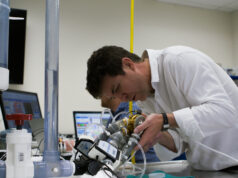
The Radboud University Nijmegen Medical Centre (Nijmegen, the Netherlands) and Main-Taunus Cardiac Center (Bad Soden, Germany) announced the results of a clinical study that demonstrated the safety for patients and clinicians can be significantly enhanced during cardiac interventions. Using Philips’ recently introduced AlluraClarity system with ClarityIQ technology, the doctors of the medical centre were (according to the company), for the first time, able to achieve a 50% reduction in X-ray dose while maintaining the excellent image quality needed during image-guided cardiac interventions. The results are expected to be presented during EuroPCR, 21– 24 May in Paris, France.
The clinical study was designed by Main-Taunus Cardiac Center and conducted at the Radboud University Nijmegen Medical Centre between September and November 2012 involving 39 patients with a BMI range of 20–37. During the study, two coronary angiography scans of the same patient were compared: for the first scan conventional interventional X-ray technology was used, while for the second scan Philips’ ClarityIQ technology was used. Six independent interventional cardiologists from across Europe (Italy, France, Germany, the Netherlands and Sweden) then evaluated the image quality of these scans, and concluded that compared to conventional X-ray technology, AlluraClarity provided equivalent image quality at 50% less X-ray dose.
“We have extensively explored and tested this new technology at our cardiac centre”, said N Reifart, co author of the study and Director of the Main-Taunus Cardiac Center, Private Clinic Bad Soden, Germany. “It now enables us to perform most diagnostic angiographies with at least 50% lower radiation levels, equivalent to less than 1mSv, with similar image quality as in the past”.
Such a significant reduction in X-ray dose benefits both patients and the staff managing their care”, said T J F ten Cate, cardiologist at the Radboud University Nijmegen Medical Centre and responsible for conducting the study. “Now that we are using AlluraClarity, we have become much more conscious about X-ray radiation dose.”
Philips is expected, at EuroPCR 2013, to be at booth #M41. Cate, according to the company, will be giving a presentation at EuroPCR titled: “Automated image enhancement significantly reduces radiation dosage in coronary angiography with preserved image quality” on Thursday 23 May, 10:57– 11:05 in room 241.
Philips AlluraClarity is currently not available for sale in USA, Food and Drug Administration (FDA) 510(k) approval pending.













